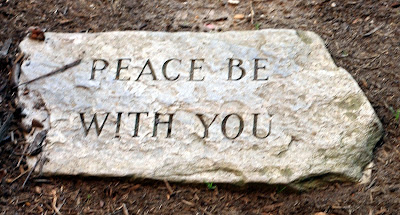DIFFERENT KINDS
OF PEACE
INTRODUCTION
The title of my homily for this 5th Tuesday of Easter is, “Different Kinds of Peace.”
I don’t know about you - but these after Easter readings can
get quite repetitive or broken "recordish".
We hear Jesus telling us over and over and over again to
love one another and how he’s trying to do his
Father’s will and commandment to love.
And I’m sure you noticed the first reader having to sail
through the waters of some tricky words
in the Acts of the Apostles. This
morning we heard about Paul and Barnabas going to Derbe, Iconium, Lystra, Pamphilia, Pisidia, Perga,
Attalia and Antioch .
All aboard! [Cf. Acts 14: 19-28]
So like you I listen to the readings over and over again for
something to hit or to challenge me.
In today’s gospel the word “peace” showed up. Like the word
“love” it too is often found in these after Easter readings. Today, I heard
Jesus saying to his disciples: “Peace I leave with you; my peace I give to you.” [Cf. John 14:27]
Then there was a
tiny twist. Jesus talks about peace and adds the nuance, ”Not as the world
gives do I give it to you.”
I said to myself, “Explore that!” I asked: “Do different
people have different takes on what the word ‘peace’ entails?” I wondered if I
had a clear take on what Jesus means by peace - giving or creating or working
towards peace.
Time was ticking, so I decided that attempts at answering those
questions could be enough for a short Tuesday morning homily.
With that as a long introduction, once more the title of my
homily is: “Different Kinds of Peace.”
HEBREW MEANING OF
PEACE
In the Jewish scriptures - “Shalom” was a greeting on
the street and on the road - which one made to one’s neighbor. It meant health,
no debts, family members are not fighting each other. It meant rain and good
crops. It meant no foreign armies or wild beasts were lurking on one’s property
or in the neighborhood. It meant one’s family is feeling God’s blessings - and
everyone is keeping the covenant with God - that is, being right with God and
neighbor. It’s a prayer: “Please God -
may that peace be flowing like a river into your family and your land.”
In the New Testament “Shalom”
meant all those same things. Then as Christ’s words made more and more impact and sense - as Christian thought developed - “Shalom” also meant union with Christ and seeing oneself as a member
of the whole Body of Christ in community. As Christian theology developed more,
it was seen as the plan and the hope and
the vision of Christ for his kingdom to come - on earth as it is in heaven - as
we pray in the Our Father. In time the Greek ideal of peace - meaning good
order and harmony - also came into the message and greeting of “Peace”.
TYPES OF PEACE - DIFFERENT FROM JESUS’ TYPE OF PEACE
My original question stayed there: what type of peace would be
different from the type of peace Jesus envisioned?
Is there anyone who thinks they will feel peace if they had
tons of money and tons of success?
Is there anyone who thinks they will be at peace if we have
bigger and better guns and bombs and greater gigantic walls protecting us - so no trouble can come in?
Does anyone think we’ll have peace without making sure
everyone gets a place at the table -
gets a voice and a vote - gets a piece of the action - and a piece of the pie? So
does anyone think we’ll have peace without having to be concerned with our brothers and sisters -
especially those in need.
CONCLUSION
After all that, I realized I still don’t get exactly what
kind of peace Jesus is pronouncing and promoting - but I hope I’m a bit closer
each day.
I know that it's stopping the rock throwing - verbal and stone - and use those rocks to build steps and bridges to each other.[1]
I get that peacemaking is work. It’s crucifixion at times. It’s
dying to self. Yet, it remains illusive - so I suppose that’s why we keep on
wishing one another “Shalom” - “Peace” - when we meet and greet each other -
and then we try to see what we can do to be peacemakers - to be instruments of
the Lord’s peace this day. Amen!
OOOOOOO
Notes:
[1] Cf. Today's first reading where they stone Paul to death to shut him up - Acts 14:19

No comments:
Post a Comment